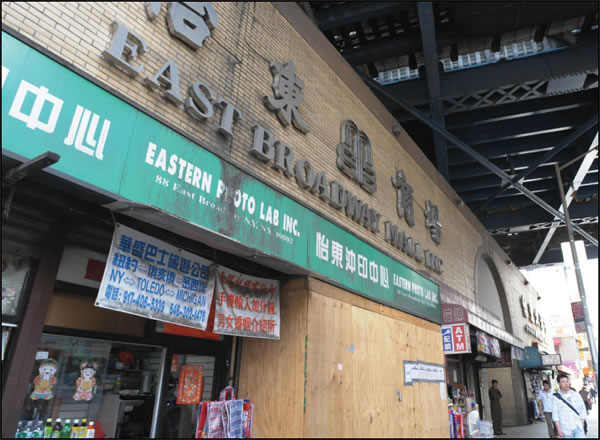By Mary Reinholz
As speeding subway trains roared above them, about 20 Chinese demonstrators stood in front of the city-owned 88 East Broadway Mall on a recent workday, holding placards in Cantonese and Mandarin accusing its operators of labor law violations and rent gouging of commercial tenants.
They were there in the freezing cold to join a Feb. 5 press conference held by the militant Chinese Staff and Workers’ Association with hopes of spurring a government investigation into questionable practices at the dingy, three-story building beneath the Manhattan Bridge.
“We’re here today to protest against the bosses for their multiple violations of the law, “ said Jennifer Lee, a Chinese Staff organizer. She was referring to Kwok Ming Chan and his son Terry, who are principals in East Broadway Mall, Inc., the mall operators who oversee about 100 small businesses believed to pay rent from $1,000 to $60,000 a year.
“For a long time they have exploited many small businesses and tenants here, and recently tried to push them out by increasing the rent by 400 percent,” Lee said. “They’re trying to gentrify the mall and kick out small businesses.”
Lee cited the case of florist Mei Rong Song, a tenant whose rent was increased from less than $3,000 a month to $12,000 in 2008. Song refused to pay and is now fighting eviction proceedings in court. She noted through an interpreter that the mall’s managers had “cut off” the heat and water to her 280-square-foot space, adding, “I can barely do business.”
Her lawyer, Candace Carponter, said Song had not been given a written lease in nine years.
At one point in the press conference, an African-American security guard for the mall appeared and said brusquely, “Can’t we break this up?” He claimed the owners were on mall property. But the demonstrators held their ground, saying it was a city site, but finally moved a few feet toward the street.
Lee also accused the mall managers of being “very unfair” in their treatment of two immigrant construction workers who did renovations at the mall on a daily basis, working “six and seven days a week in dangerous conditions,” with no overtime or unemployment benefits when they were laid off.
Both men, Hong Wu Zang, 43, and Bao Qing Li, 50, speaking through an interpreter, noted mall management provided 1099 forms, generally given to freelancers, instead of W-2 forms for employees.
Zang, who was injured last year while working at the mall for $80 a day over a nine-month period, said he worked “ten hours a day, sometimes seven days a week,” but was now unable to do heavy work and had not found other employment. He received some workers’ compensation, but Lee said it was discontinued.
Li, 50, who was earning $150 a day in 2009, claimed he was told by mall manager Terry Chan that he was a “temporary worker,” not an employee, even though Li had been working at the mall over a period of more than one year.
East Broadway Mall, Inc. entered into a 50-year lease with the city in 1985 to develop the mall, then in unused space. Under its lease, E.B.M. pays the city a base annual rent, a percentage of gross operating revenue and a payment in lieu of taxes. For the mall’s most recent fiscal year, from Sept. 1 to Aug. 31, 2009, E.B.M. paid the city a total of $1.47 million. That amount represents $622,080 in base rent, $166,160 as a percentage of gross revenue and $681,184 in lieu of taxes, according to figures supplied by city officials.
Neither Kwok Ming Chan nor Terry Chan could be reached for comment. One of the Chans’ business telephone numbers was disconnected. Another referred calls to a 917 number, which had a full voice mail box. Robert Wang, the Chans’ Canal St. lawyer, did not respond to repeated calls for comment. But he denied charges by tenants that the mall operators charged illegal “key money” to a New York Times reporter last year.
The New York State Department of Labor did not respond to calls by press time for comment on the mall management’s labor practices. But Downtown attorney Daniel L. Alterman, who specializes in employment law and has represented Chinese Staff and Workers’ Association, noted that full-time workers who work at a site for more than a year are entitled to be treated “like all full-time workers and not as freelancers. If the city is allowing these practices to continue, it should cease and desist and make sure that all employees are treated the same, as required under the Fair Labor Standards Act and New York State labor law,” Alterman said.
The Department of Citywide Administrative Services, which oversees the mall, has stated before when asked by reporters, that it would review the practices of the mall operators. The city agency did so again on Feb. 12 in a formal statement to The Villager.
“Under its lease with the city, East Broadway Mall, Inc. is responsible for making lawful arrangements with subtenants,” said Mark Daly, a DCAS spokesman. “DCAS is aware of the allegations against the company, and we have referred the matter to appropriate law enforcement authorities. We want to ensure that 88 East Broadway Mall continues to be an attractive business location for Chinatown’s entrepreneurs.”



































